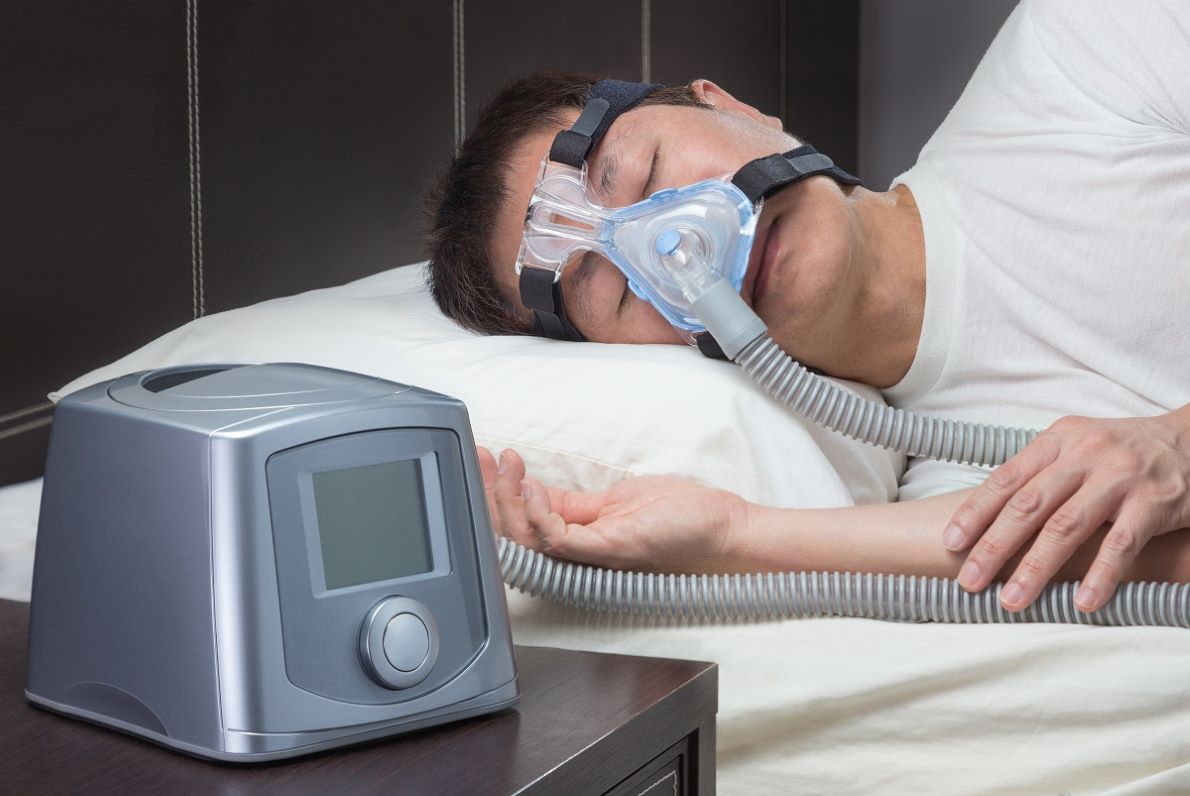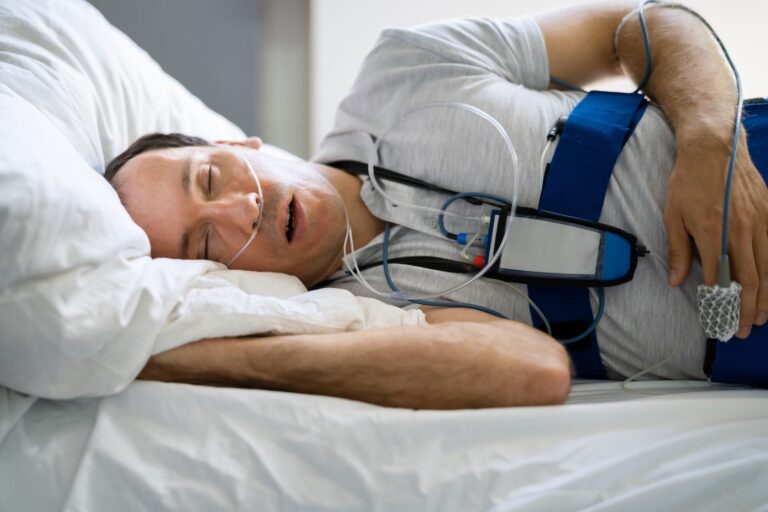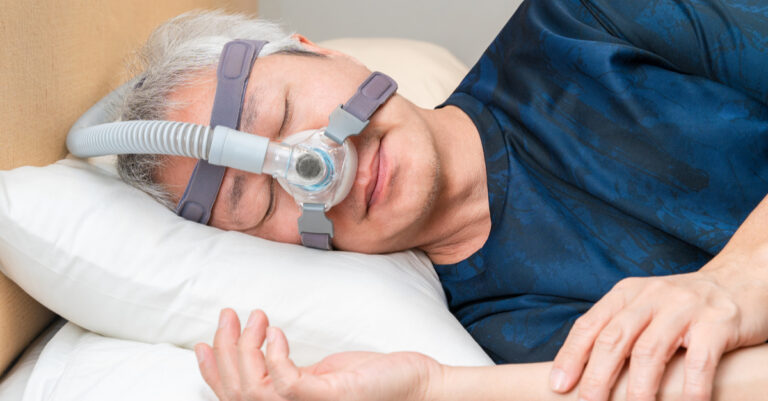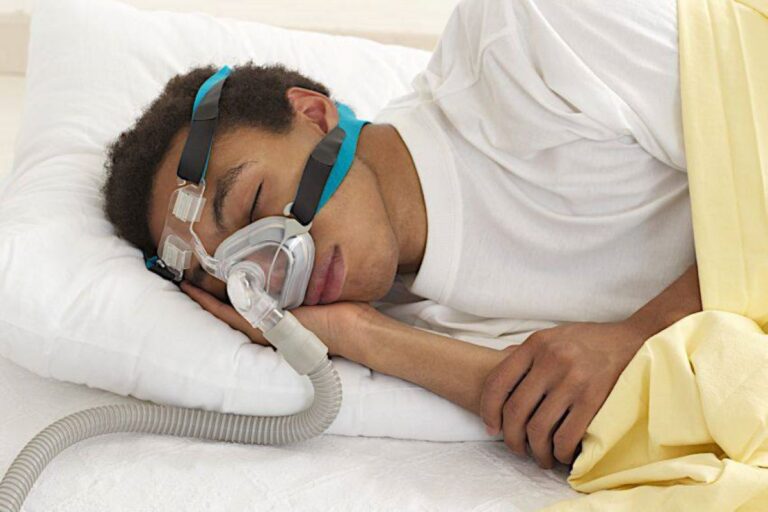What Is a Home Sleep Study and How Does It Work?
A home sleep study is an innovative way to diagnose sleep disorders without needing to stay overnight in a hospital. Instead, you can do it in the comfort of your own bedroom.
During a home sleep study, you’ll receive a portable device that you can use on your own. This device will record your sleep patterns throughout the night, providing valuable information for diagnosing any potential sleep issues.
How Does It Work?
The portable monitoring equipment consists of lightweight sensors designed for easy self-application. You’ll wear these unobtrusive devices whilst sleeping in your familiar environment, allowing for more natural sleep patterns compared to clinical settings.
Key physiological parameters monitored include:
- Breathing rate – tracks respiratory patterns and interruptions
- Oxygen levels – measures blood oxygen saturation via finger sensor
- Heart rate – monitors cardiovascular responses during sleep
- Airflow – detects breathing cessation through nasal cannula
- Chest movement – records respiratory effort and patterns
Why Choose a Home Sleep Study?
A Home Sleep Study Hobart involves collecting comprehensive data about your sleep behaviour, breathing patterns, and oxygen levels. This information enables sleep specialists to identify conditions such as obstructive sleep apnoea without requiring you to spend a night in an unfamiliar clinical environment. The technology captures the same essential data as traditional sleep laboratories whilst you rest in your own bed.
Why Are Home Sleep Studies Becoming Popular in Hobart?
The benefits of home sleep studies that Hobart residents are experiencing stem from significant advantages over traditional hospital-based testing. Traditional sleep studies require you to spend an entire night in an unfamiliar hospital environment, often leading to disrupted sleep patterns and potentially inaccurate results.
1. Convenience of at-home testing
Home sleep studies allow you to maintain your regular bedtime routine whilst wearing portable monitoring equipment. You sleep in your own bed, surrounded by familiar sounds and temperatures that promote natural sleep cycles. This authentic environment typically produces more representative data about your actual sleep patterns. This is a stark contrast to the experience of traditional hospital sleep tests, which can be uncomfortable and disruptive.
2. Improved accessibility of sleep studies
Hospital sleep laboratories often have waiting lists extending several months, whilst home studies can be scheduled within days or weeks. The streamlined process eliminates many barriers that previously prevented timely sleep disorder diagnosis.
With home sleep studies, you avoid:
- Overnight hospital accommodation costs
- Time away from family and work commitments
- Anxiety associated with sleeping in clinical settings
- Complex scheduling around hospital availability
You receive the same quality diagnostic information without the inconvenience and expense of traditional laboratory testing, making sleep health assessment more accessible to Hobart’s growing population. In fact, home sleep testing has become a viable alternative for many, providing a practical solution for those in need of timely and accurate sleep disorder diagnosis.
Who Facilitates Home Sleep Studies in Hobart?
Air Liquide Healthcare Sleep Solutions is Australia’s largest provider of home sleep apnea studies, offering comprehensive diagnostic services directly to residents of Hobart. This industry leader has established itself as the primary provider connecting patients with accessible sleep testing solutions throughout Tasmania.
The company employs an integrative approach that brings together respiratory specialists and sleep physicians to ensure accurate diagnosis and treatment pathways. You benefit from this collaborative model where multiple medical professionals review your case, providing thorough validation of sleep study results and treatment recommendations.
Partnerships with CPAP manufacturers are a crucial part of the service delivery model in Hobart. Air Liquide Healthcare works closely with leading equipment brands to ensure you have access to the latest diagnostic technology and treatment devices. These partnerships also extend through established networks of sleep study providers in Hobart, including:
- SNORE Australia
- Healthy Sleep Solutions
- Mycroft
- Complete Care
- Sleep Disorder Australia (SDCA)
This extensive network ensures comprehensive coverage across the Hobart region, connecting you with local clinics and specialists who can provide ongoing support throughout your sleep health journey.
How Is the Patient Pathway Structured for Home Sleep Studies?
The patient pathway home sleep study process begins with your GP or specialist recognising potential sleep disorder symptoms and providing a referral. This referral triggers a comprehensive screening process designed to ensure you meet Medicare eligibility requirements under MBS guidelines.
Initial Assessment Steps:
- Complete detailed screening questionnaires covering sleep patterns, symptoms, and medical history
- Review of Epworth Sleepiness Scale scores and other validated assessment tools
- Verification of Medicare eligibility criteria for bulk-billed diagnostic testing
Once approved, you’ll receive your portable monitoring device through a streamlined diagnosis to treatment process. The device fitting appointment ensures proper sensor placement and provides clear instructions for overnight recording. You’ll learn how to position the nasal cannula, chest sensors, and finger oximeter correctly.
Data Collection Process:
- Record sleep data for 1-2 nights in your own bed
- Return equipment via prepaid courier or drop-off location
- Automatic data upload to registered sleep scientists for analysis
This structured approach eliminates the complexity often associated with traditional sleep studies whilst maintaining diagnostic accuracy for conditions like obstructive sleep apnoea.
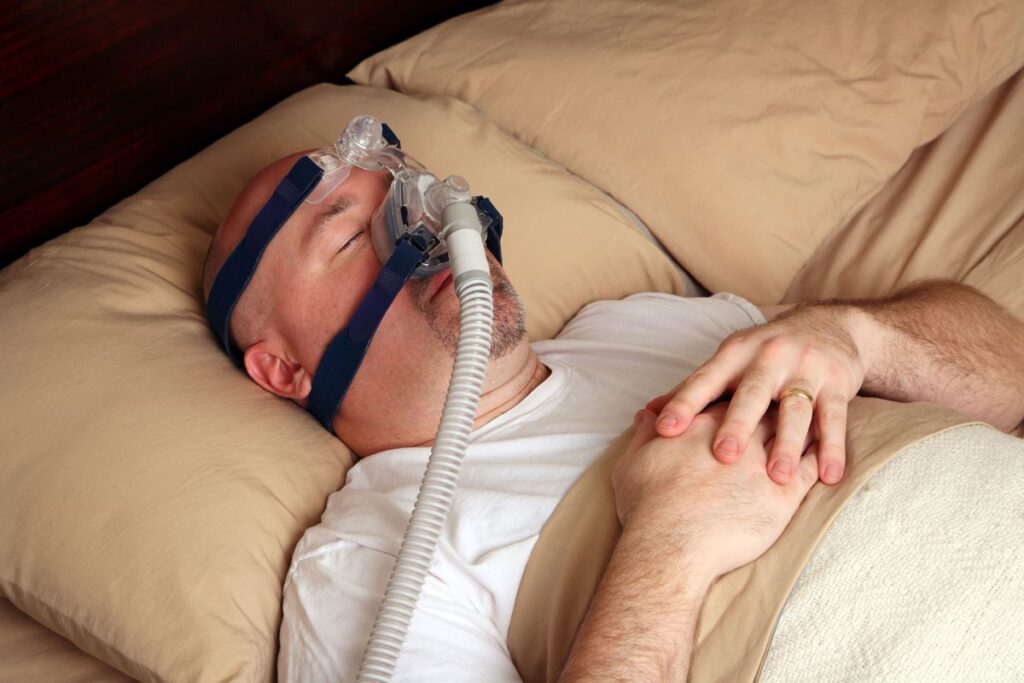
What Equipment Is Used During a Home Sleep Study?
Home sleep study equipment consists of lightweight, portable monitoring devices designed for comfortable overnight use in your own bedroom. The testing apparatus typically weighs less than 500 grams and connects to your body through strategically placed sensors.
Sensor Placement
Sensor placement follows a specific configuration:
- Forehead sensor – monitors brain activity and sleep stages
- Ear sensor – tracks additional neurological signals
- Chest bands – measure respiratory effort and breathing patterns
- Finger sensor – continuously records oxygen saturation levels
- Nasal airflow cannula – detects airflow interruptions and breathing irregularities
The sensors used in sleep studies capture multiple physiological parameters simultaneously. Your oxygen saturation readings help identify periods when breathing stops or becomes shallow. The nasal cannula measures both airflow volume and breathing rhythm throughout the night.
Additional Sensors
Many devices include leg movement sensors attached to your lower limbs. These sensors detect periodic limb movements associated with restless leg syndrome, providing additional diagnostic information beyond sleep apnoea detection. The integrated monitoring system records all data continuously, creating a comprehensive picture of your sleep patterns and breathing behaviour.
How Is the Data Collected Analysed and Diagnosed?
Sleep data analysis Hobart follows a rigorous two-stage validation process that ensures accurate diagnostic outcomes. Once you return your home sleep study equipment, registered sleep scientists begin the comprehensive review of your overnight recordings. These qualified professionals meticulously examine every aspect of your sleep data, from breathing patterns and oxygen saturation levels to heart rate variations and movement patterns throughout the night.
The role of sleep scientists and physicians operates through a collaborative framework where initial data interpretation by certified sleep technologists undergoes thorough physician validation. Sleep specialists and respiratory physicians examine the analysed data to confirm or rule out obstructive sleep apnea and other sleep-related breathing disorders. This dual-review system maintains the highest diagnostic standards whilst ensuring you receive accurate results.
Diagnostic reporting culminates in detailed clinical reports that provide clear insights into your sleep health. These comprehensive documents include:
- Apnea-Hypopnea Index (AHI) measurements
- Oxygen desaturation patterns
- Sleep position analysis
- Recommended treatment pathways
Your physician receives these reports within days of your study completion, enabling prompt treatment decisions and therapy recommendations tailored to your specific sleep disorder profile. You may like to visit https://fullyalivemedicine.com/sleep-apnea-test-hobart-early-detection-and-treatment-options/ to get more about Sleep Apnea Test Hobart: Early Detection and Treatment Options.
Are Home Sleep Studies Covered by Medicare or Private Health Insurance?
Medicare coverage for home sleep studies in Tasmania operates under specific Medical Benefits Schedule (MBS) guidelines that determine your eligibility for subsidised diagnostic testing. You can access Medicare-funded home sleep studies in Hobart when you meet the established criteria, which typically include documented symptoms of sleep-disordered breathing and appropriate medical referrals from your GP or specialist.
The MBS framework covers diagnostic sleep studies when they align with clinical necessity requirements. You’ll need to complete screening questionnaires that assess your symptoms and risk factors, helping determine whether your case qualifies for Medicare support. This system ensures that diagnostic resources reach patients who genuinely require sleep disorder evaluation.
Private health insurance rebates for CPAP therapy present additional coverage opportunities beyond the initial diagnostic phase. Many private insurers offer specific packages that include CPAP equipment and ongoing therapy support. You should review your policy details carefully, as coverage levels vary significantly between providers and policy types.
Some insurers provide comprehensive sleep disorder packages that encompass both diagnostic testing and subsequent treatment equipment. These packages often include CPAP machines, masks, and ongoing support services, making them valuable for patients requiring long-term therapy management.
What Treatment Options Follow a Home Sleep Study Diagnosis?
Once your home sleep study confirms a diagnosis of obstructive sleep apnea, several evidence-based treatment options become available in Hobart. The most common and effective approach involves CPAP therapy initiation Hobart services, which provide comprehensive support from initial setup through ongoing management.
CPAP Therapy Programs in Hobart
CPAP therapy programs in Hobart typically include:
- Initial device fitting with personalised mask selection
- Pressure titration support to optimise treatment effectiveness
- Regular monitoring through data downloads and clinical reviews
- Ongoing therapy guidance to address comfort issues and compliance challenges
Air Liquide Healthcare’s local network facilitates these programs through partnerships with established sleep brands including SNORE Australia and Healthy Sleep Solutions, ensuring you receive consistent support throughout your treatment journey.
Alternative Treatment Options
Mandibular advancement devices treatment options represent an alternative approach for patients with mild to moderate sleep apnea or those unable to tolerate CPAP therapy. These custom-fitted oral appliances work by repositioning your jaw during sleep to maintain airway patency. Sleep physicians in Hobart can assess your suitability for these devices based on your specific sleep study results and anatomical considerations.
Your treatment selection depends on apnea severity, personal preferences, and clinical factors identified during your diagnostic assessment.
Where Can Patients Access Home Sleep Study Services in Hobart?
Hobart residents have access to numerous clinics offering home sleep studies Hobart bulk-billed services, making diagnostic testing more accessible than ever before. The city’s healthcare network includes multiple facilities that provide both traditional in-laboratory studies and convenient home-based testing options.
Air Liquide Healthcare operates through several partner clinics across the Hobart region, including locations affiliated with:
- SNORE Australia – Specialising in comprehensive sleep disorder management
- Healthy Sleep Solutions – Offering integrated diagnostic and treatment pathways
- Complete Care – Providing bulk-billed home testing services
- Sleep Disorder Australia (SDCA) – Delivering end-to-end sleep apnoea care
These clinics ensure you can access testing without lengthy waiting periods or geographical barriers. Many facilities offer bulk-billed services for eligible patients, removing financial obstacles to diagnosis.
The distributed network of providers means you can typically find a clinic within reasonable travelling distance from your home. This accessibility proves crucial for timely diagnosis and management, as untreated sleep disorders can significantly impact your health, work performance, and quality of life. Quick access to testing allows for earlier intervention and better long-term outcomes.
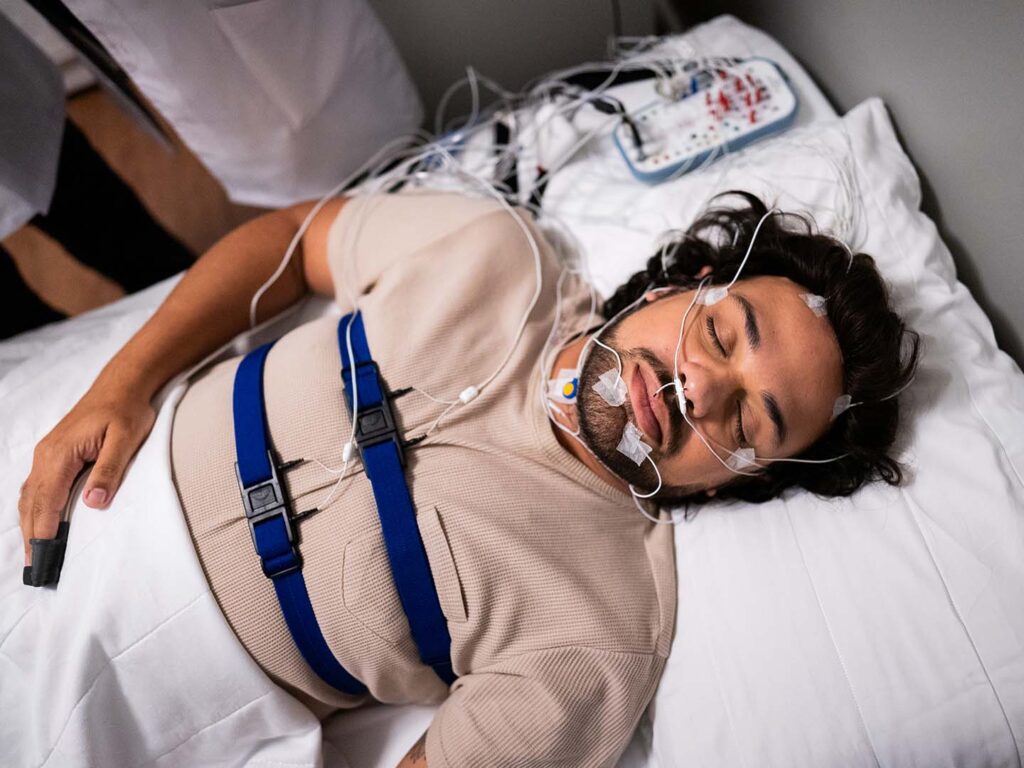
What Are the Key Benefits of Choosing a Home Sleep Study in Hobart?
Home Sleep Study Hobart: Convenient At-Home Testing Explained offers significant advantages that make it the preferred choice for many Tasmanians seeking sleep disorder diagnosis.
1. Cost-effectiveness
You avoid expensive hospital fees and overnight accommodation costs that traditional sleep lab studies require. Medicare coverage for qualifying patients eliminates the need for mandatory private health insurance, making diagnostics accessible regardless of your insurance status.
2. Convenience and comfort
You sleep in your own bed, following your regular bedtime routine without the stress of unfamiliar hospital environments. This natural setting often produces more accurate results since you’re sleeping in conditions that mirror your typical night’s rest.
3. Faster access to diagnostics
The streamlined process gets you from referral to results more quickly, enabling prompt treatment decisions.
4. Greater freedom during testing
The portable monitoring equipment doesn’t restrict your movement like traditional polysomnography setups, ensuring the advantages of home-based testing in Tasmania deliver both convenience and cost-effectiveness for comprehensive sleep disorder evaluation.

